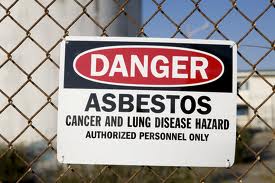- January 21, 2013
- 0

Asbestos Cancer
Inhaled asbestos can lodge itself in the body’s organs, causing cells to mutate and become cancerous
While the term “asbestos cancer” most often refers to mesothelioma, a number of other cancers are associated with asbestos exposure. Lung cancer, for example, is a direct result of asbestos exposure, and some studies have suggested an association between asbestos exposure and gastrointestinal and colorectal cancer.
Elevated risks for a number of other cancers listed below continue to be investigated. According to the World Health Organization, approximately half of all deaths from occupational cancer are caused by asbestos.
Mesothelioma Cancer
Mesothelioma cancer is the only asbestos-related cancer almost exclusively caused by asbestos. Mesothelioma can develop after someone inhales or ingests elevated amounts of asbestos over time.
The inflammation and DNA damage that can result from asbestos exposure may eventually lead to the formation of tumors in the lining of the lungs (pleura) or abdominal cavity (peritoneum). In rare cases, the lining of the heart or testicles can be affected.
Asbestos-Related Lung Cancer
Lung cancer is the second most common cancer in the United States and the Occupational Safety and Health Administration calls it “the greatest health risk for American asbestos workers.” Asbestos-related lung cancers are diagnosed more frequently than any other type of asbestos-connected disease. The Environmental Working Group estimates that between 5,000 and 10,000 asbestos-related lung cancer fatalities have occurred each year over the span of the last two decades.
Asbestos exposure accounts for 4% of lung cancer cases in the United States
Unlike mesothelioma, the risk of lung cancer is greater among asbestos-exposed smokers. The synergistic effect of smoke and asbestos drastically weakens the lungs and makes smokers with past asbestos exposure more likely to develop lung cancer. This substantially contributes to the rate of asbestos-related lung cancer diagnoses.
Other Asbestos-Related Cancers
Aside from mesothelioma and lung cancer, asbestos has been associated with a number of other cancers. Research is still determining the extent to which asbestos can cause other asbestos cancers, but studies indicate that asbestos exposure is associated with gastrointestinal and colorectal cancer. Additionally, asbestos may elevate the risk of developing kidney, throat, esophagus and gallbladder cancers.
Other Cancers Potentially Associated with Asbestos Exposure
- Gastrointestinal Cancer
- Colorectal Cancer
- Breast Cancer
- Prostate Cancer
- Hodgkin’s Lymphoma
- Non-Hodgkin’s Lymphoma
- Ovarian
- Leukemia
Incidence of Asbestos-Related Cancer
The Environmental Working Group (EWG) states that mesothelioma, asbestosis and asbestos-related lung and gastrointestinal cancers have claimed as many as 230,000 lives between 1979 and 2001. The following chart reflects the EWG’s yearly morbidity estimates for three primary asbestos-associated cancers as well as asbestosis, a non-cancerous condition that is commonly diagnosed in asbestos cancer patients.
Causes and Risk Factors of Asbestos-Related Cancer
As its name suggests, asbestos cancers are caused by the inhalation or ingestion of asbestos. When these toxic fibers enter the body, they can cause genetic changes in healthy mesothelial cells. Over time, healthy mesothelial cells die and tumors grow in their place. Asbestos exposure is practically the only cause and risk factor for mesothelioma, while lung cancer can be caused by smoking cigarettes or exposure to radon.
Although smoking exacerbates any potential symptoms that asbestos-related diseases may display, it does not increase your risk of developing mesothelioma if you’ve been exposed to asbestos. Conversely, smoking combined with asbestos exposure does greatly increase the risk of developing lung cancer. Other factors that may affect a person’s overall health and risk of developing asbestos cancer following asbestos exposure may include a lifestyle low in exercise, high in stress and poor dietary choices.
Source: http://www.asbestos.com/cancer/
- January 21, 2013
- asbestos




